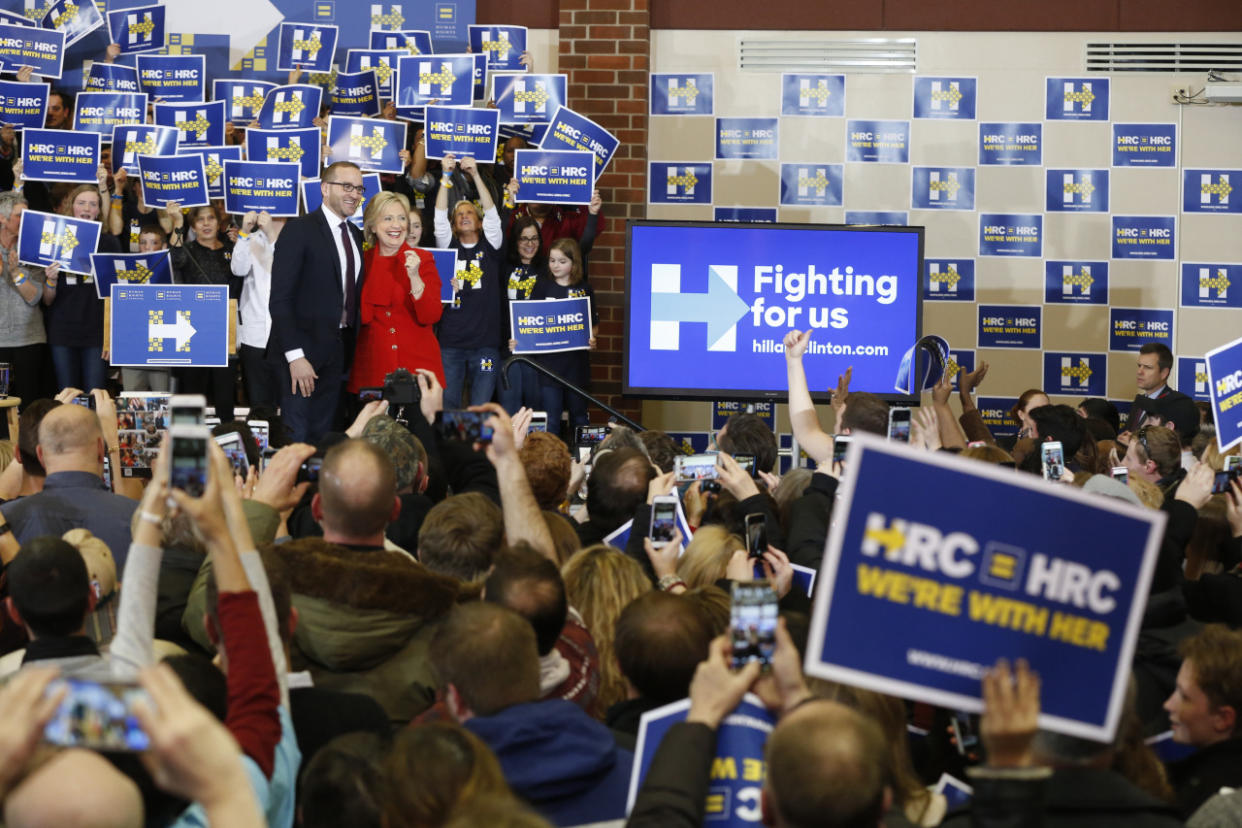Inside the Human Rights Campaign as it stumps for Clinton in New Hampshire

Hillary Clinton officially accepts the Human Rights Campaign’s endorsement on Jan. 24, 2016. (Photo: Conrad Schmidt/AP Photo)
MANCHESTER, N.H. — Just across Elm Street in downtown Manchester sit two campaign offices. On one side of the street, the Hillary Clinton for President campaign has a “private,” non-field office. Across the way, a group condemned by Clinton’s opponent Bernie Sanders as an emblem of “the establishment” rallied troops on her behalf on the final day of the primary election here that every poll was predicting she would lose.
The Human Rights Campaign set up shop in New Hampshire about a month ago, to help mobilize its members on behalf of Clinton. But — in a first for the group, at least in a presidential election — it also committed to turning out Democrats who are not members, but rather people the group had earlier identified as caring passionately about LGBT issues.
Leading the effort in New Hampshire is Marty Rouse, a veteran political operative who in 1992 worked as Bill Clinton’s field director for New York City, organizing a busload of volunteers to come canvass in the Granite State. “I was here 24 years ago when Bill Clinton was the comeback kid, and now I will be here tonight to see Hillary Clinton. So sort of full circle. Twenty-four years ago, I was doing the same work here in New Hampshire.”
Yahoo News spoke to Rouse in a spare, street-level suite of rooms scattered with the detritus of the last day of a hard-fought political campaign — cold pizza, stacks of posters — and populated by a team of staffers and interns sitting at long tables making phone calls to get out the vote for Clinton on Tuesday afternoon. A Clinton supporter and professional baker from Massachusetts had dropped off a tray of mixed cookies, the sugar cookies each molded with a raised “H” for Hillary.
SLIDESHOW – New Hampshire results are in >>>
Rouse said that Sanders’ labeling the Human Rights Campaign “the establishment” brought home to him the tensions at the heart of the organization’s role in American life today, as well as for gay people more generally. “When you hear ‘the establishment,’ you know in some ways, it’s a wonderful thing to hear. And in other ways, it’s just horrifying, it’s really horrifying,” he said, “because there is so much pain and suffering inflicted still among LBGT people all across this country.”
Rouse elaborated: “We have had so much success as a movement on marriage equality, especially. And yet there are still young people slitting their wrists because they can’t be open about their lives to their own family or their church, and people are bullied in their churches, at school, and killing themselves or thinking about killing themselves.”
Just that day, he’d talked to a man who had a friend in his late 30s who was still in the closet and felt unable to live openly, he said.
Rouse lived in Vermont for five years, after falling in love with the state while running the Democratic Party’s coordinated campaign there in 1996, for Bill Clinton’s reelection. That vantage point allowed him to see Sanders up close: “I know Sen. Sanders very well — pretty well, I should say.” He especially remembers him at the time of the Vermont Democratic Party’s fight to retake the Vermont statehouse, which it lost control of in an electoral backlash after civil unions became legal in Vermont.
“Bernie Sanders was not on the radar screen at all during that battle. He was not public at all… talking about LGBT equality,” Rouse recalls. Clinton, he is quick to add, was also not an early proponent of marriage equality. Nor was President Obama. They have all evolved on the issue.
Ultimately, Rouse’s support for Clinton today rests not only on his long ties to her husband’s electoral fortunes but on two actions that she does not highlight in her stump speeches, which mainly focus on gay rights issues domestically.
“Where she really stuck out for me, at least on LGBT issues, is when she was secretary of state,” said Rouse. “She was a leader in mobilizing support internationally for LGBT rights, and she did it in two main ways. One was, she corralled other countries that were supportive of LGBT rights, and she helped create the Global Equality Fund, an international fund of governments invested in support for LGBT rights around the world. Unprecedented in world history. That was huge.
“The other thing she did,” explained Rouse, “was she went to Geneva and spoke at a United Nations event about how LGBT rights were human rights. Now that might not sound too startling to progressive people in America. But to say that on a global stage, when you are talking to African nations and Middle Eastern nations, is quite significant.”
It’s unclear how much the Human Rights Campaign’s support has made a difference on the ground in New Hampshire. All told, it made more than 21,000 calls to voters in the past week in the state, and knocked on 3,780 doors — a relative drop in the bucket in a state where more than a quarter million people were expected to vote in the Democratic primary.


